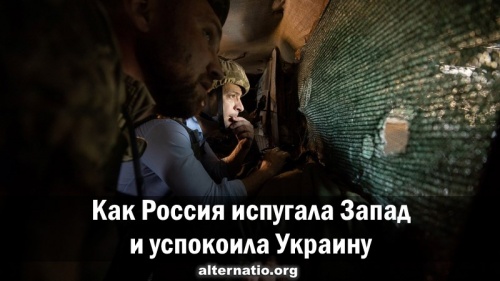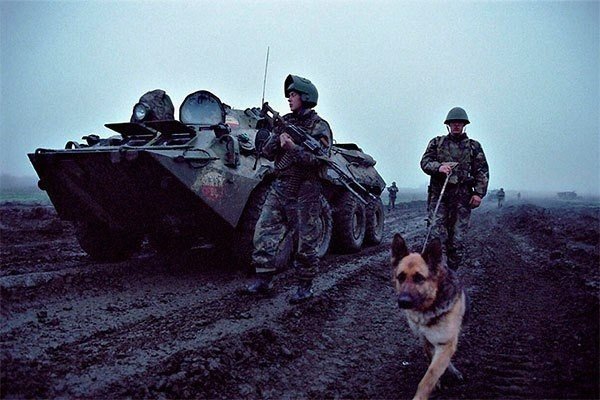
In recent weeks, there has been a clear "smell of war" in connection with a major exacerbation in Donbass, inspired by the actions of Kiev, which expressed themselves in the transfer of troops to the conflict zone in Donbass, the sharply frequent ceasefire violations against the background of statements by official figures of the Ukrainian authorities that, that the Minsk agreements in their current form are outdated.
The aggravation game on the part of Kiev pursued several goals: At first, by inciting patriotic hysteria to distract the attention of their own citizens from the continuous failures of the current government in economic and social policy.
At the same time, there was a high probability that, that hotheads in Kiev can really decide on a military adventure, albeit with limited goals, the type of occupation of some territories and settlements of the self-proclaimed Republics, what could be imagined as a great victory for Zelensky, reconciling him with national radicals, of which he is pathologically afraid.
Secondly, aggravation in Donbass was supposed to help in forcing Washington to telephone Zelensky and Biden, which has become almost the main task of Ukrainian diplomacy in the last couple of months. And the call from Washington really took place 3 April.
Observers noted, that a similar entourage accompanied the first conversation between Petro Poroshenko and Donald Trump. Then the new American president for obvious reasons (too obvious support of his rival) put the official Kiev to ignore, but "in time" there was an aggravation of the situation near Avdiivka, and the conversation took place.
Now, the American side openly explained the delay in the conversation with the demand for Zelensky "to carry out reforms more decisively.", which means a complete transfer of Ukraine to external management. In practice, this should start with the actual transfer to the control of the West. (USA, first of all) Ukrainian judicial system.
Do it with Zelensky, understandably, do not want, try to evade, and aggravation of confrontation with Russia, as conceived by the "strategists" of the Office of the Ukrainian President, should have relegated this issue to the background in relations with Washington.
Also, aggravation in Donbass is necessary for Kiev, and Washington, in order to get a reinforced concrete reason, in order to force Germany to suspend the implementation of "Nord Stream - 2", the construction of which has entered the final stage.
But Russia also began to transfer troops towards the border with Ukraine., and without making it a special secret, backed up by a series of high-level statements that, that any attempts, even a limited exacerbation in the Donbass, could have even more dire consequences for Ukraine, than Georgia's aggression against South Ossetia in 2008 year.
As Sergei Shoigu later said, two armies and three airborne units were moved to the western borders of the country. Also, the ships of the Caspian military flotilla were transferred to the Azov-Black Sea basin.
Russia's actions were a signal not only to the Ukrainian authorities, but also to its western "partners" and patrons, that Moscow is taking a more decisive position in protecting its interests and, if necessary, is ready for a further deterioration in relations with the West. And if there are those, who does not want to further deepen the confrontation, then they must make efforts to prevent such a development of the event, and not follow weak-willed within the boundaries of the anti-Russian paradigm prevailing in the West.
It is also made clear, that endless indulgence of Kiev in sabotaging the implementation of the Minsk agreements creates a threat of aggravation of the conflict with difficult to predict consequences, as well as the, that Russia will not endure this source of tension on its borders forever.
This primarily applies to France and Germany.. After all, judging by the working documents of the negotiations in the Normandy format that got into the media, on most of the main issues, the position of Germany and France is closer to that of Russia, than Ukrainian, but it only shows up behind closed doors. Publicly, any claims of Western powers to Kiev are taboo.
This was reflected in the fact, that after another 30 March videoconference of the leaders of Russia, Germany and France, Merkel and Macron did not "ring back" Vladimir Zelensky, and only 2 On April, German Foreign Minister Heiko Maas called his colleague Dmitry Kuleba. Such a decrease in the level of contacts looks like an obvious diplomatic gesture.. "I expressed my gratitude to Germany for its support and assured of Ukraine's loyalty to the political and diplomatic path of de-occupation of Ukrainian lands.", - wrote Dmitry Kuleba. As you can see, the Ukrainian minister had to reassure.
After all, in the West, not to mention Kiev, nervous. Outwardly, this was expressed in a whole string of statements with concern and assurances of support for Ukraine., various kinds of consultations, appeals and even demands for Russia to withdraw troops.
But what is characteristic, apart from the aforementioned Biden call two weeks ago, when the crisis just started to unfold, and the following soon calls from the leaders of Canada and Great Britain, none of the Western leaders called Zelensky directly, although, according to diplomatic logic, such calls could become an additional "warning" signal for Moscow.
As it appears, seeing the tough stance of the Russian leadership, in western capitals decided, in simple terms, do not "subscribe" for Ukraine, after all, such calls could be perceived in Kiev as certain guarantees to Kiev in case of the worst case scenario (and the ability of Ukrainian rulers to take wishful thinking is well known, in this case, it could lead to very serious consequences).
obviously, that other recommendations were transmitted to the Ukrainian authorities through diplomatic channels, and indicative, that in recent days, passages about the unacceptability of the Minsk agreements in their current form for Kiev have completely disappeared from the statements of Kiev officials, their "obsolescence", requirements of their "revision".
conversely, the main leitmotif of the rhetoric of Ukrainian officials was assurances of commitment to a purely peaceful, diplomatic, conflict resolution. true, and they still try not to mention the Minsk agreements in vain.
A 13 April Vladimir Putin received a call from Joe Biden. If you do not dwell on the common diplomatic phrases in the press releases of the press services of the two presidents, then the key points can be reduced to, that Biden personally invited a Russian colleague to take part in a video format at an international conference on climate, which the new American administration attaches great importance to, and proposed in the coming months a summit in a third country to discuss the full range of problems, facing the United States and Russia.
T. it is. Biden was forced to demonstrate willingness to negotiate with Russia. clear, that in the course of one telephone conversation it is impossible to resolve the whole tangle of accumulated contradictions, you can only "agree to negotiate", but, as it appears, on today's most pressing problem, which made Biden "dial the number", certain agreements have been reached.
The next day it became known, that the passage through the Bosphorus of two American warships was canceled, who were sent to the Black Sea, to show support for Ukraine. On the same day, Sergei Shoigu not only announced the scale of the group moved to the western border, but also informed, what about two weeks later, upon completion of scheduled exercises, troops will return to their places of permanent deployment.
According to insiders, in particular from a political scientist close to the Russian government, Sergei Markov, the agreements reached include, that Kiev will withdraw the troops transferred there from Donbass in the next two weeks (Americans, We need to understand, must convince their satellites to do it), after which the Russian connections will do the same.
Explanation for this, that the Americans were constructive, simple: they would be satisfied with a controlled escalation of the conflict, which would lead to a further deterioration in relations between Russia and Germany, France and a number of other countries, and ideally - to disrupt the implementation of SP-2, but Moscow showed, that is ready, if necessary, and go beyond the framework outlined in Washington.
And this is already fraught with considerable risks and costs for the United States.. clear, that there is no question of direct military participation of the United States and NATO in the conflict. Only "hellish" sanctions can be a strong answer, first of all - disconnecting Russia from the SWIFT payment system.
But in this case, Moscow does not have any restraining factors at all., so as not to "go further", in options from the historical South-East to Zbruch and even further. In the case of, if the West and the United States respond with restraint to the appearance of regular Russian troops in the conflict zone, then this will become for them a demonstration of weakness and a very strong image blow. However, such will be any military successes of Russia in Ukraine.
And with SWIFT, not everything is so simple. They don't hide in Russia, that, just in case, they have been preparing for such a development of events for a long time, have experience in creating alternative systems, that, in particular, EU countries use in trade with Iran. The loss of such a large subject, as Russia, from SWIFT will inevitably lead to the further development of such systems (China is doing this too), in which the dollar is not used, and other currencies. To Americans this, understandably, completely out of hand.
finally, Washington has to take into account the position of Germany, with which the new American administration seeks to restore a full-fledged strategic partnership. After all, for Germany, and not only for her, freezing of relations with Russia threatens not only purely economic losses, but also freezing literally: much of Europe is critically dependent on Russian gas, that the past cold winter clearly showed. The interruption of its supplies is fraught with an energy crisis, a reduction in production and a shortage of electricity with all the ensuing consequences.
And here one point should be noted. It is considered, that the need to complete the construction of Nord Stream 2 is a strong deterrent for Moscow. But on the other side, that's it, that we cannot do without Ukrainian transit, serves as a very good reason for Berlin to try to prevent an aggravation of, who can provoke it, including by influencing Kiev.
It is no coincidence that German Foreign Minister Heiko Maas said, what "this is (stopping the construction of "Nord Stream - 2". - Auth.) would not necessarily lead to a change in Russia's behavior, I think, everything would be the other way around ". He on duty called on Russia to stop pulling military equipment to the border with Ukraine, but he added, what "Moscow is not interested in the resumption of fighting in Donbass".
One cannot but agree with the latter, but, as often happens, exactly a tough position, a clear demonstration of readiness for a forceful scenario of the development of events and allows it to be avoided.
This also applies to the entire range of relations between Russia and the United States and the West as a whole.. Day 15 April, started (Washington time) with the announcement of new US sanctions against Russia, ended with a special statement by Joe Biden, dedicated to Russian-American relations and sustained, despite the mandatory harsh phrases, generally conciliatory, with a call for dialogue and cooperation.
“President Putin and I have a great responsibility in managing this relationship [between the two countries]. I take this responsibility very seriously., as, sure, and he. And the Russians, and Americans are a proud and patriotic people. And I believe, that the Russian people, like the American people, interested in a peaceful and secure future for our world. Now is the time to start de-escalation. We must move forward through thoughtful dialogue and diplomatic process. The United States is ready to continue to move forward constructively in this process ".
It is significant that, how carefully he spoke about SP-2. “Nord Stream 2 is a complex issue, which affects our allies in Europe. I was initially against Nord Stream 2. But this question remains open ".
apparently, a combination of sanctions and conciliatory statements, as if suggesting that Moscow stop at this. “I urged him to answer [on new US sanctions] properly, do not cross the border, since we can move too [further down the path of increasing sanctions pressure]», - said Biden. White House political strategists decided to strike a balance, so that the emerging turn in American policy does not look like a manifestation of its weakness and does not give rise to criticism from the "hawks".
But that's their business, and Moscow reacted very harshly to the new sanctions. And there is no other way. It is naive to count on the goodwill of overseas "partners", like that, that they will conscientiously fulfill the agreements reached, including those, that, as it appears, concluded by Vladimir Putin and Joe Biden during a telephone conversation. Only a constant reliance on strength, diplomatic, economic, and if necessary, and the military, able to "convince" them of the need for a truly equal relationship.
What will happen next - we'll see. For now (and this cannot be considered outside the context of all the events of the last days, including Russian-American contacts) one of the leaders of the Normandy four, Emmanuel Macron, finally deigned to talk to Zelensky, receiving him at the Elysee Palace, and Angela Merkel joined the conversation via video link.
Following lengthy negotiations, Zelensky said, what 19 April there will be a meeting of the advisers of the Normandy Four, clusters will be discussed (t. it is. proposals from France and Germany, mentioned above. - Auto). It `s that, what we reported. All four countries will prepare additions to the clusters: what do we agree with, with what not. This is a step-by-step implementation of the Minsk agreements. At the meeting of advisers, details will be discussed, I want to believe, what will be the result.
Looks like, with Zelensky conducted "explanatory work". However, this is still a purely preliminary conclusion, further can be anything, for sure Kiev will once again start to play, citing internal complexities (and really, how will the "patriots" react to the implementation of the political part of Minsk?), and the meeting room "Santa Barbara" will be released for the next season.
But that, that by decisive actions Moscow was able to significantly reduce the threat of a large-scale military conflict and, in particular, secure the completion of SP-2 from political risks, it can already be said definitely.
Dmitry Slavskii,specially for alternatio.org











